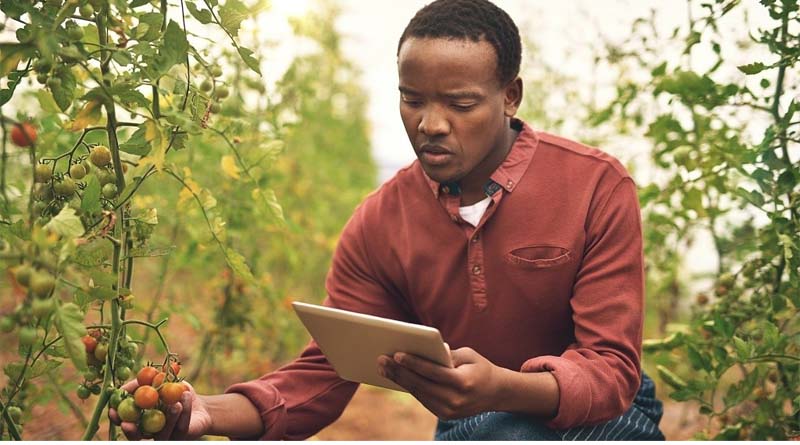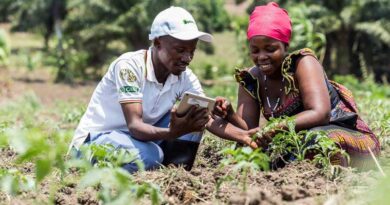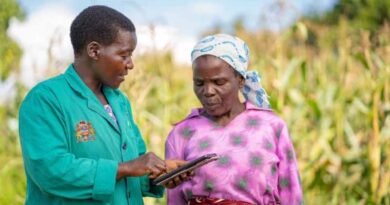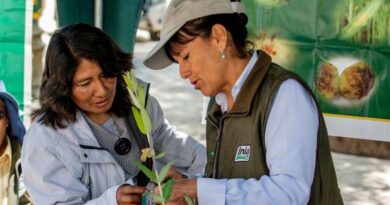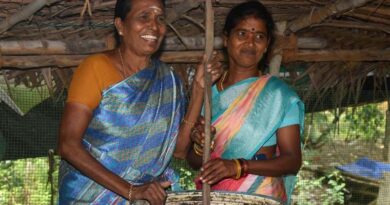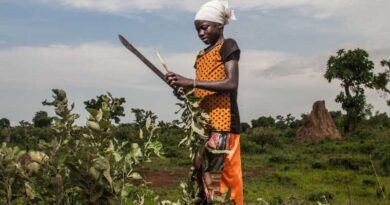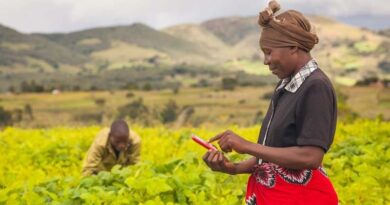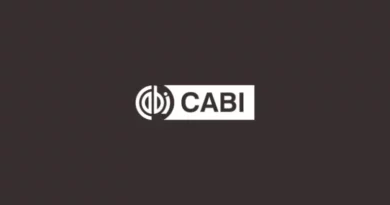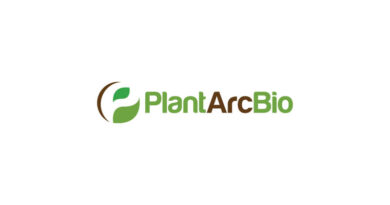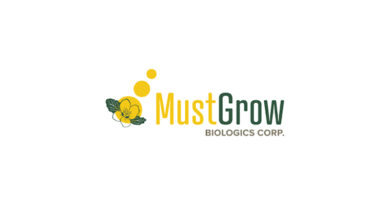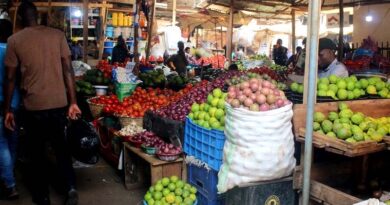6 ways that PlantwisePlus tools are transforming digital development
13 October 2023, India: Digital development has come a long way over the past decade. And it’s helping farmers to access agricultural knowledge. Reaching smallholders with farming know-how can be challenging. Most smallholders have limited access to agricultural information. Moreover, public extension services are becoming more difficult to access. Tanzania only has four extension agents per 10,000 farmers. In India, the number decreases to just two per 10,000 farmers. Face-to-face extension support is becoming more difficult to access.
However, digital development presents a promising solution. Technology can bring agricultural knowledge to smallholder farmers. This enables them to cultivate better crops and improve their livelihoods. Furthermore, technology make agriculture more appealing to young farmers.
Digital development and PlantwisePlus
From its inception, PlantwisePlus has championed a digital approach to extension support. Dr Ulrich Kuhlmann leads the PlantwisePlus programme at CABI. In April this year, he attended the G20 Meeting of Agricultural Chief Scientists, which took place in Varanasi, India. Here, Dr Kuhlmann talked about digital agriculture. He focused on challenges and opportunities for digital development.
This blog features six ways digital technology and tools, that were mentioned in his presentation, are transforming international development.
- The foundation of digital development – harnessing the internet
Internet access is a crucial component of digital development. It’s even been included as an indicator within the Sustainable Development Goals (SDGs). When harnessed, the internet becomes a critical tool for digital development. It enables access to a vast pool of knowledge. This is information that would otherwise remain out of reach for many. It facilitates communication and knowledge sharing. It supports access to digital tools that can empower individuals. And it can improve education and even drive economic growth.
However, it’s important to recognise certain inequalities. Rural women are often excluded from the digital revolution. Internet prices remain unaffordable in 52 out of 95 low and lower-middle-income countries. This disparity affects nearly one billion people. Even regions with affordable internet prices are affected. Income inequality hinders access for millions of individuals.
Taking these limitations into account, PlantwisePlus explores digital advisory services supporting smallholders. The programme focuses on reaching extension service providers. PlantwisePlus has created resources for extensionists who then connect with smallholders in rural communities. And this often happens over mobile technology.
- The fastest-growing technology in digital development – mobile technology
Smartphones have revolutionised communication worldwide. And they have had a significant impact on digital development. The first public mobile phone call was made in 1973. It marked the beginning of a transformative journey. Today, there are 7.33 billion mobile phone users globally. And 6.92 billion use smartphones.
This surge in smartphone adoption has brought unprecedented access to information. Smartphone penetration varies among countries. However, it’s predicted that by 2025, almost three-quarters of internet users will access websites using smartphones. This accessibility presents a tremendous opportunity. Through it, digital platforms can be used to reach farmers. We can share even more vital agricultural knowledge. It can help to foster more sustainable farming practices. Moreover, it can empower farming communities worldwide.
PlantwisePlus provides digital advisory tools to agricultural advisors and farmers. It enables them to access the latest plant health information. This revolutionises agricultural extension services. Extensionists (and farmers) can empower themselves with science-based knowledge.
- Creating a universal plant health knowledge hub – the PlantwisePlus Knowledge Bank
The PlantwisePlus Knowledge Bank is a valuable digital resource. It serves as a comprehensive repository of plant health information. It’s designed to assist extension workers and farmers. It also supports academics and researchers. In a nutshell, it helps people make informed decisions about crop health.
The knowledge bank provides access to over 15,000 crop health resources. This includes, for example, pest management decision guides and training materials. It consolidates and disseminates up-to-date and science-based information. This resource plays a crucial role in promoting sustainable agriculture.
- Helping farmers choose safer alternatives to pesticides – the CABI BioProtection Portal
The CABI BioProtection Portal is an online open access knowledge resource. It’s a comprehensive source of information about biological plant protection. This includes biopesticides and biological control agents (such as beneficial insects). It also includes natural substances and products like pheromones that control pests.
Importantly, it helps farmers select natural alternatives to chemical pesticides. These products are better for consumers, farmers and environmental health. The portal helps farmers and extensionists to make informed decisions about effective, safe pest management. With its focus on alternatives to chemical pesticides, the CABI BioProtection Portal plays a vital role in promoting sustainable farming.
- The PlantwisePlus digital toolkit
The CABI BioProtection Portal and PlantwisePlus Knowledge Bank are part of a bigger digital toolkit. The PlantwisePlus Toolkit is a collection of digital advisory tools to support decision making. They are aimed at agricultural advisors, including extension officers and agro-input dealers. With this toolkit, advisors have access to the latest information on pest management. This includes pest distribution, diagnosis, management and more.
Alongside the knowledge bank and portal, the toolkit includes e-learning courses covering crop pest diagnosis. The course also covers crop pest management and an introduction to bioprotection products. It includes a Fertilizer Optimizer Tool to help farmers improve their fertilizer use. The Crop Sprayer App enables smallholders to calculate the right amount of pesticide to use. And a Plantwise Factsheet Library App delivers up-to-date information on crop pest management. Also part of the toolkit are two game apps that help farmers simulate crop management and pest diagnosis.
- Helping farmers navigate millions of agricultural apps – the Crop App Index
Millions of agricultural apps are available across different platforms. This can make finding the right app challenging. The Crop App Index helps to address this. The index is an invaluable resource for identifying agricultural digital tools. It currently comprises 910 apps.
The Crop App Index enables users to refine lots of results using filters. These include country, crop and language. The index also shows the apps’ user rating scores. This can indicate the quality of an app – important, given there are so many.
We strongly believe that digital farm advisory can help to overcome the recognized limitations of face-to-face extension. The design and development of these products must be as functional as possible. This ensures in-country use and ownership of digital products. And it must be available in local languages. In addition, it is important to give more attention to the sustainability of digital tools. PlantwisePlus will also work towards improving women’s access to digital advisory services. The programme will do this by creating the necessary enabling environment, engaging men to shift social norms. This allows women to access digital devices while building their capacity to use digital tools. Through the creation and application of digital technologies, we can bring science-based agricultural knowledge to millions more smallholder farmers.
(For Latest Agriculture News & Updates, follow Krishak Jagat on Google News)

